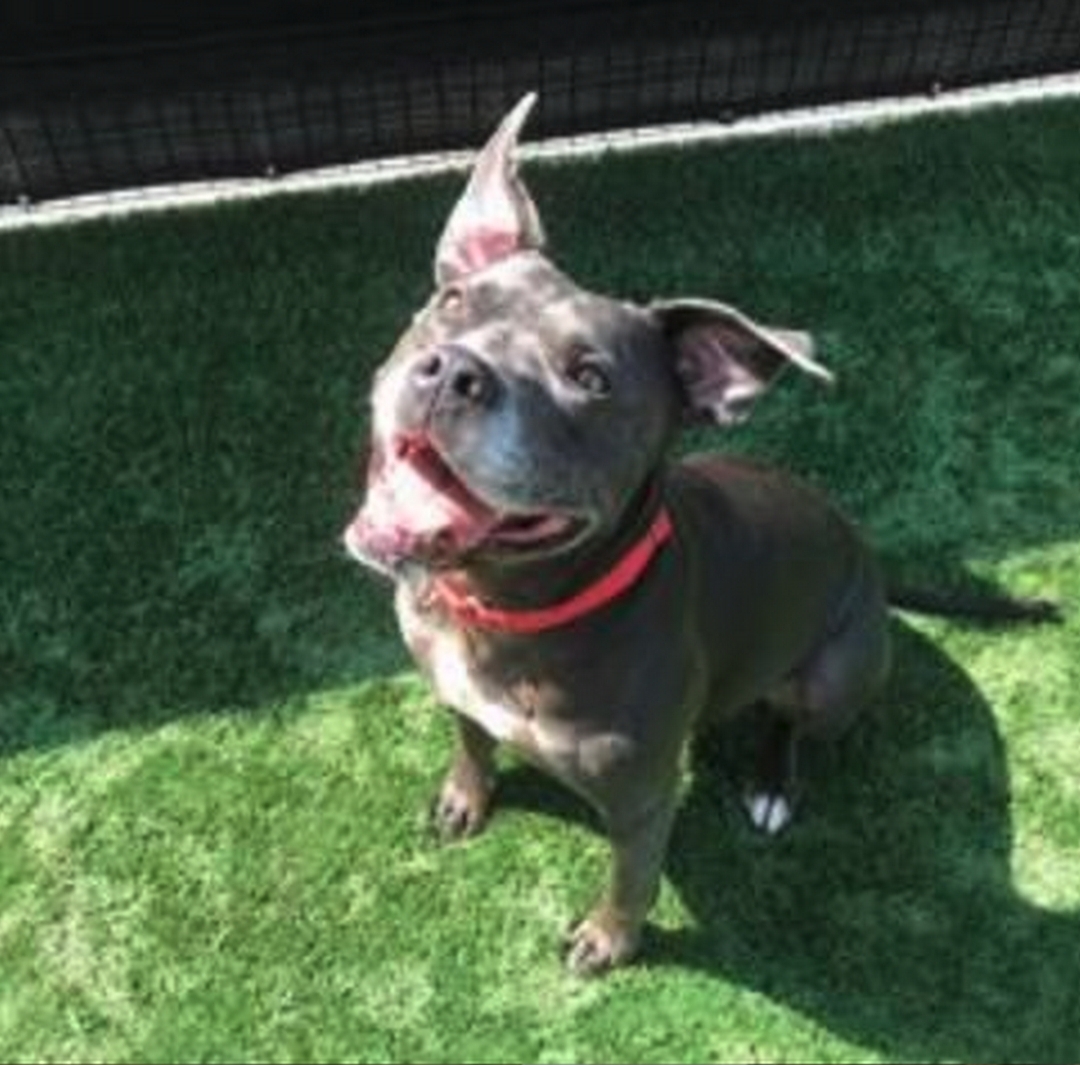Yesterday, I walked out to my barn loft office to write and network on behalf of dogs in harm’s way in shelters.
I was particularly intent on finding the fate of Missy, a seven-year-old Pittie on the kill list of a California county-funded shelter. Her plight had been well-shared on Instagram, and as a rescue dog advocate, writer, and networker, I wanted to do my part to help save her. Pledges were made on Pet Pardon, an app that lets animal advocates rescue, adopt, and donate money to give at-risk shelter pets a second chance at life.
I rang the shelter, and after jumping through all those telephonic prompts and holds like Michael Scott calling on behalf of Dunder Mifflin, a friendly male voice finally answered.
“I’m calling on behalf of a dog you have in your care named Missy, animal ID 1234567,” I inquired. Is she still there? Knots twisted in my stomach for the dreaded response.
“Hold on…” I could hear him typing.
“She’s been on the shelter’s kill list since Monday…”—I hoped for a sympathetic response.
“Yes, she is,” the eager man said.
“Does she have a hold for rescue?” I treaded into deeper waters. Finding a foster with pull privileges—meaning pre-approved with the shelter—and rescuing a special-needs dog with a problematic history is no small undertaking. It can become a Sisyphean effort to locate a foster with the training, the psychological, emotional, and physical wherewithal to take on the work and challenge of training a dog who might not have ever been trained in her or his short life, much less socialized or adopted to any particular environment.
“She has a rescue working on a foster home,” he explained. “She needs to go to a home with no pets. You should call every day,” he offered.
Relief flowed in like melting snow feeding a mountain stream. At least she was still alive. I explained to the man why I was calling and who I was. I told him we were all working hard to find a foster. He seemed eager to explain the shelter’s situation with her and others like her.
“I try to counsel people when they adopt a dog from here,” he said. “About the breed, the type of dog, what they can expect. They come in looking for a Maltese and walk out with a Labrador. Three weeks later, they’re walking back through the same doors, returning the dog like a set of sheets, saying that it wasn’t what they expected. They seem to miss that they’re taking on a life, not buying a new car. Shelters are frequently used as dumping grounds for the animals.”
My eager-to-please, chatty friend, as it turns out, is an adoption counselor at one of these shelters.
Beyond processing simple paperwork—behavior liability waivers drafted by lawyers, questionnaires about home living conditions, meets-and-greets, and inquiries on a dog’s history—he tries to educate people on the dog’s behalf.
We spoke about shelter policies and live release rates, communications and partnerships with rescues nearby, and where to find status on the dogs before their situations turned urgent. All the while, I kept thinking of Missy and her friends who have hard-luck stories and deadlines on their lives.
She herself was someone’s good dog—until she took matters into her own hands and rid her family home of its resident cat. I could empathize with Missy, after spending my lifetime with dogs who others threw away, several of which had themselves taken out a feline or two. Our own dog, Charlie, took a chipmunk out of the running just this morning. Both he and Smudges, our mountain mutts, are far more attuned with the wildlife than many more civilized, urban dogs, hunting and chasing all things furry and scurry, than most people are comfortable with.
I felt sorry for Missy and all her friends, for she is forced to live in a far more civilized environment than her powerful disposition could tolerate. I didn’t know if her prior people had trained or socialized her. As with most dogs, her story is untold except the high crimes and misdemeanors leading to her fate in a shelter, bereft of her people, and at the literal mercy of others with understandable, cautious emotional investment.
“I tell the workers, the volunteers,” my chatty friend said, “don’t get too attached. Of course, that dog is here now and we’re always so happy when a dog walks out the door with a new owner, and we hope that they won’t return. But there are always going to be some, it’s just the way that it is, who won’t walk out of here.”
Images of dogs in black garbage bags arose. Owner surrenders, the shelters call them. In Texas, it means instant death for a dog if the shelter is at capacity. In California, it’s all up to economics, policies, and space. I’d seen such images before and struggled to erase them from my mind’s eye. It’s the emotional edge of rescue dog advocacy and the epitome of empathy drain, a la Joan Halifax. It’s also one of the reasons why I never post such images. I believe they torment sensitive animal-loving souls who already have the information and who struggle daily against such fate for a dog into whose eyes they stare and warm necks they wrap their arms around.
No such heart ever wants to think that such a fate will befall a dog with whom they’ve become emotionally invested.
And yet, I’m fairly certain that the people who surrendered Missy to the shelter never had such images in their mind. Many delude themselves with mental pictures of a sun-filled, sprawling farm on which their once-trusted and beloved dog will wind up. It’s simply part of some internal mistruth they tell themselves as they turn into the shelter parking lot and hand the leash over the counter.
I thought about Missy, her two months of waiting for a warm sofa to call her own again, the people who betrayed her in all the ways that I never could. I thought of her world of canine emotions and trying to understand what was expected of her and what was off-limits.
Things like the family cat.
“And Missy?” I asked. “Any possibility for an extension of time to allow her to walk out alive?”
“Check back tomorrow,” my chatty friend said.
I went through the week worried about her fate, networking, calling, and checking in with the shelter. Had she had a rescue commitment yet?
No, not yet.
We continued. Sharing, updating, contacting rescues in the area to save her life. In rescue terminology, we talk about pulling an animal. No such fate had arrived for Missy.
Until Thursday came. A rescue in California, Woofy Acres, stepped up to pull her and another at-risk dog, Shaw. She was adopted within a few days after landing safely out of harm’s way.
While it’s not the usual timeframe in which an adoption can occur, for Missy, it turned out to be a happy ending, a second chance at life, indeed. For anyone who has ever taken in a rescue dog, the gratitude often acts to cleanse the negative. Perhaps it’s a different home, lifestyle, training, or quite simply, the realization that life is fragile and uncertain at any time for us all.
~
How you can help:
1. Just say no to backyard breeders. In California especially, some 800,000 bully breeds are killed each year as shelters and rescues struggle to find suitable homes for them. Thousands are never trained or socialized, and among other power breeds, these dogs wind up in the hands of people who understand little about their needs and the importance of training them to become good canine citizens.
2. Spay and neuter your dog. Their gonads are not yours, dude.
3. Support more legislation providing more funding for California’s government-run shelters to help educate and counsel more people on specific traits of a breed to reduce return rates.
4. Support “No Kill” movements in your home state.
5. Donate to foster-based rescues in your community. (In California? Send Woofy Acres a donation on Missy’s behalf!) Know someone who truly needs to surrender their dog? Rather than a shelter, suggest they reach out to a nearby rescue that can connect with others willing to foster their dog. It bypasses the shelter system and gives the dog a fighting chance at life.
6. Donate, sponsor, volunteer, foster, or adopt a homeless dog. Take care of the life already here.
Namaste, and thank you for reading.












Read 0 comments and reply